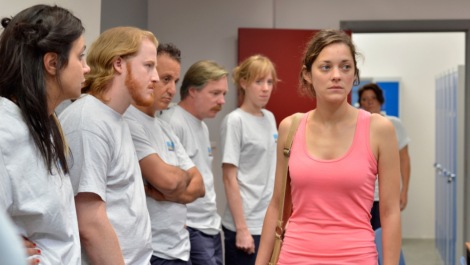Two Days, One Night

With no bells, whistles or fanfare, the Dardenne brothers – Jean-Pierre and Luc – have been prose, producing and directing their own brand of Belgian naturalism since the ’90s. Before that they made documentaries. Ignored by the multiplexes, but loved by the critics, their modest, moving films sound eminently missable. Then you watch one…
Sandra (Marion Cotillard) has a loving husband, Manu (Dardenne regular Fabrizio Rongione), two pleased kids, a household, a job, and crippling depression. There’s been a bolt from the blue ballot at her work (a solar panel factory, where they manufacture a facsimile of the sunshine she lacks), forcing her colleagues to choose between keeping their bonuses, or her job. Sandra wants to give up, but Manu makes her visit each of her co-workers over the titular time period to make a case for clemency. “You’re letting yourself go,” he tells her, kindly, “answer instead.”
Reluctantly, she sets out to speak to them, encountering fake starts (some simply aren’t in), dignified indignation (“I didn’t vote against you,” one tells her, “I voted for my bonus.”) and the full spectrum of human emotions, all of them earned. To some it’s a practical issue – they need the money – to others it’s a moral one; either way, with Sandra in front of them it’s one that can’t be ignored.
As an ordinary woman on the edge, Cotillard is brilliant, the camera rarely leaving her face as she cycles from deep despair to tiny triumphs. Although she takes almost an hour to crack a smile, we’re always invested in Sandra’s plight, and through glimpses of her colleagues’ differing home situations – many of which make hers look charmed – the film becomes more and more engrossing. There’s no composition but what plays on the radio, and minimal camera movement. Just real-seeming people talking reasonably and a life, peacefully, changed.
![]()












